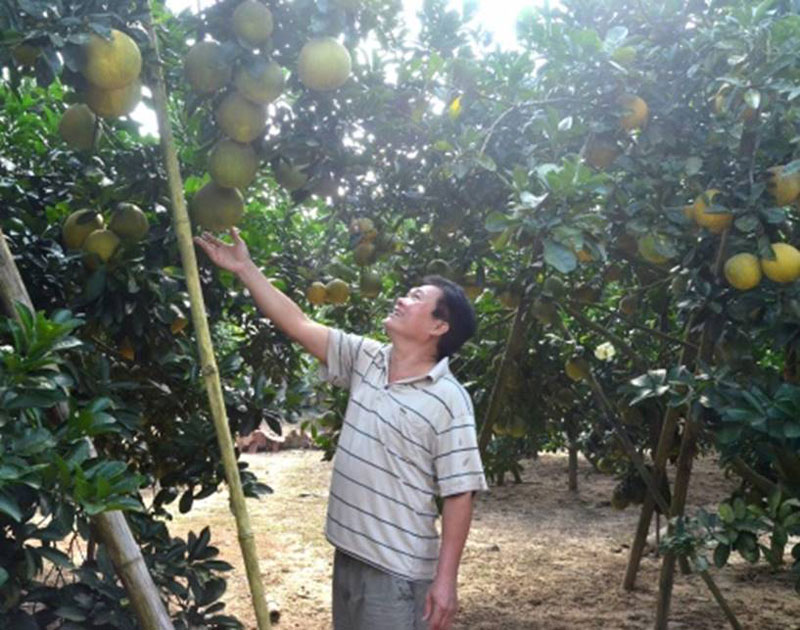
(HBO) - In December, Tan Lac district began harvesting grapefruits - the most well-known local specialty.

Photo:
In order to ensure productivity, VietGAP-standard grapefruit orchard brings revenue
of over 200 million VND to Bui Van Vinh family in Dong Tien village, Dong Lai
commune, Tan Lac district.
This year, nearly 100 grapefruit trees of Bui
Van Vinh, a farmer in Dong Tien village, Dong Lai commune, Tan Lac district, yielded
well again. The most fruitful tree bears over 500 fruits while the rest has 300
fruits per tree on average. All grapefruit trees are cultivated under VietGAP
standards so that their output, quality and consumption are also ensured,
bringing a stable income to his family.
like Vinh’s family, the family of hamlet chief
Luong Ba Cuong is excited to enter the grapefruit harvest season. Cuong said the
village is home to 70 houses which all grow grapefruit trees on a total area of
over 20ha. His family and 22 others join the Dong Lai clean farm produce
cooperative with 10ha of grapefruits grown under VietGAP standards. Though newly
established since early 2017, the cooperative has so far achieved remarkable
results. Up to 53 cooperative members are realising a plan to bring Tan Lac red-flesh
grapefruits to the market. To do that, all fruits must meet high quality
standards, particularly 30ha of grapefruits which have achieved VietGAP quality
standards.
At present, Tan Lac district boasts 52ha of
VietGAP-certified grapefruits in Dong Lai, Thanh Hoi and Tu Ne communes. Its total
grapefruit farming area has soared from nearly 110ha in 2013 to about 1,046ha,
mostly in low-lying communes.
Around 395ha of Tan Lac grapefruits are ready
for harvest now. Each ha of red-flesh grapefruits yields 35,000 fruits on
average, equivalent to 30 tonnes per ha at the price of nearly 15,000 VND per
fruit, bringing an average income of 525 million VND per ha per crop. For green
skin grapefruits, the average yield is 15,000 fruits per ha, or 20 tonnes per
ha at the price of roughly 30,000 VND per kg, bringing an average income of 600
million VND per ha per crop.
With high economic value during the crop,
grapefruits promise to bring high incomes to hundreds of local households./.
Dao Village’s honey – a product certified with a 3-star OCOP (One Commune One Product) rating by Thong Nhat Agricultural Cooperative in Dao Village (Hoa Binh City) – is highly regarded by consumers for its quality, richness, and variety in packaging. The distinctively sweet taste of Dao Village’s honey leaves a lasting impression on anyone who has tried it.
In alignment with Project No. 07-DA/TU, issued by the Hoa Binh provincial Party Committee on November 1, 2021, Lac Thuy district has actively promoted investment and supported the sustainable development of its industrial and handicraft sectors during the 2021–2025 period. Alongside this, the district has remained committed to preserving and revitalising traditional craft villages.
Located in the northern part of Lac Thuy district, with a temperate climate and fertile soil, Phu Thanh commune has great potential and advantages in growing tea. The long-standing experience, combined with strict adherence to organic farming practices in the tea gardens, ensures that the dried tea products from Phu Thanh and Lac Thuy as a whole are sold out immediately upon production, providing a stable and prosperous life for the local people.
Amid efforts to streamline the administrative apparatus, Hoa Binh province has intensified measures to address challenges in land clearance, resettlement support, and infrastructure investment, aiming to speed up the progress of key projects.
Hoa Binh province has posted an unprecedented economic growth rate of 12.76% in the first quarter of 2025, marking its highest quarterly performance to date and positioning it as the second fastest-growing locality in the country, trailing only Bac Giang province.
Under current regulations, products in the One Commune – One Product (OCOP) programme that are rated three stars or higher must undergo re-evaluation every three months. However, in reality, some of these products fail to consistently meet the required standards, raising concerns about the sustainability of their OCOP certification. This underscores the urgent need for producers to enhance product quality and gradually develop their OCOP products into strong, marketable brands.



